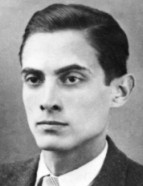

Born in Coimbra into an urban bourgeois family, son of lawyer, writer and painter Avelino Cunhal (1887-1966), Álvaro Cunhal graduated in Law from the Universidade de Lisboa [ University of Lisbon ] with a thesis on the decriminalisation of abortion (1940). A communist political leader and intellectual, he became secretary-general of the Portuguese Communist Party (1961-1992), member of parliament (1975-1992), minister without portfolio in the provisional government (1974-1975) and state councillor (1982-1992). He was an active contributor to newspapers such as Avante!, O Militante, Seara Nova, O Diabo, Sol Nascente and Vértice.
For Álvaro Cunhal, historical knowledge was not simply a specific disciplinary field, but rather the primary and general source of meaning in which understanding of the world and the determination of duty found their foundation. It was in the dialectical link attributed to becoming that Cunhal, as a Marxist, glimpsed the thread of intelligibility that allowed him to discern the meaning of the human condition and evolution, while at the same time subordinating, as a communist leader, each of his actions to the purpose of contributing to the era of collective emancipation that the times would bring. Thus, historical consciousness as the ultimate frame of reference does not emerge in his writings as a distant backdrop, but rather as a presence so constant that past, contemporary and emerging figures and circumstances appear arranged in a single scenario, which can be expressed in the same language and understood according to a single logic.
On the one hand, the broad categories that would allow us to think about power and collective life – the state; classes and class struggle; modes, relations and forces of production; revolution; among many others – would not be rooted in considerations of strict rationality, but would present themselves as expressions of fundamental historical constants that would run through different eras and, as such, also through the very long duration of capitalism. On the other hand, each of the phenomena of social reality is interpreted in the light of the general historical meaning attributed to it, which proves to be as valid in political analysis as in the understanding of legal provisions or even in polemical, critical and essayistic activity of an ideological, literary and artistic nature.
This work is financed by national funds through FCT - Foundation for Science and Technology, I.P, in the scope of the projects UIDB/04311/2020 and UIDP/04311/2020.
